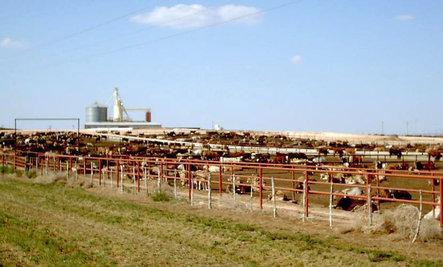The Environmental Working Group (EWG) released a reported titled A Meat Eater’s Guide to Climate Change + Health: What You Eat Matters. Their main point is that the production of meat for mass consumption contributes very much to climate change. It also creates large amounts of pollution and consumes vast stretches of land that used to be part of the wild, but were converted to factory farming.
Beef, cheese, lamb, pork and farmed salmon generate the most greenhouse gases, according to EWG. They also have the largest environmental impact, other than farmed salmon.
“Producing tremendous quantities of meat and dairy requires large amounts of pesticides, chemical fertilizer, fuel, feed and water. It also generates greenhouse gases and massive amounts of toxic manure and wastewater that pollute groundwater, rivers, streams and, ultimately, the ocean.” (Source: EWG)
The amount of faeces and urine generated by factory farms is huge. As it was reported on this site recently, they generate 100 times the waste of human sewage plants. Excess manure generates methane, a greenhouse gas, and factory farming is the fastest growing source of it, according to Mercy for Animals.
Dead zones in the Gulf of Mexico where there is no, or virtually no, marine life are created by excess fertilizer on crop fields that are grown to feed factory farm animals. The runoff of animal faeces and urine also contributes to these dead zones. 607 028 square kilometres of land in the U.S. is used just to grow food for farm animals.
In a sense, the connection between meat and dairy consumption and climate change has already been covered by a United Nations report from several years back. The UN report stated agriculture contributes more to climate change than all transportation combined. (One might have assumed emissions from cars, trucks, buses, trains and planes, etc. were the greater contributor to climate change.)
The EWG report contains some shocking statistics, such as this one: “From 1971 to 2010, worldwide production of meat tripled to around 600 billion pounds while global population grew by just 81 percent (US Census Bureau, International Data Base).” (Source: EWG) They also say by 2050 if the rate of production remains the same, the total globally could be 1.2 trillion pounds per year.
Each one of the above factors should be a compelling enough reason to reduce meat intake or stop altogether, but there is still another major issue with mass meat production. Most antibiotics in the U.S. are used on factory farms, and they wind up in the environment where they could create resistance in bacteria that eventually could make people sick.
The global human population is also steadily increasing, a trend that will undoubtedly make climate change worse. Our food choices on an individual level do make a big difference collectively.
Image Credit: H2O
Adapted from an article by Jake R.




